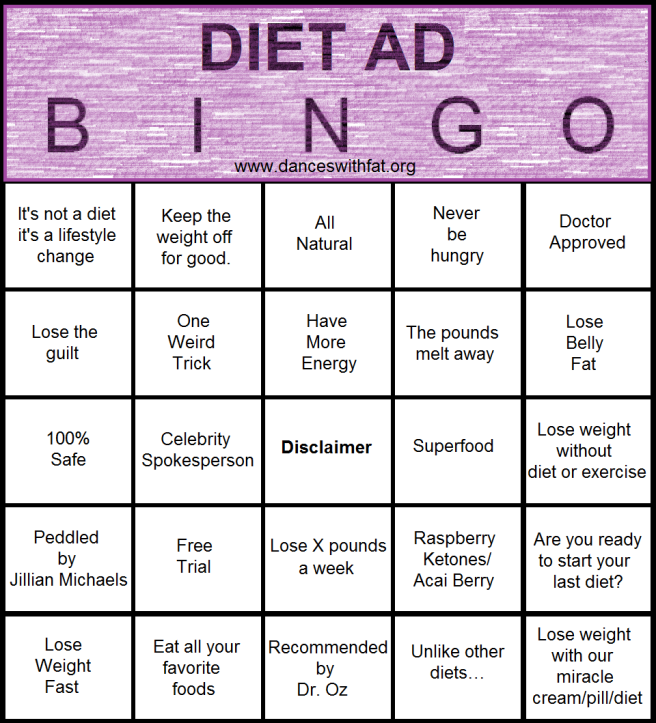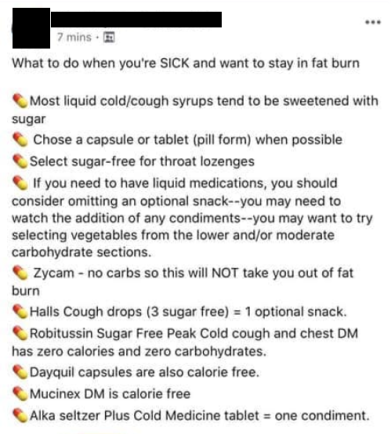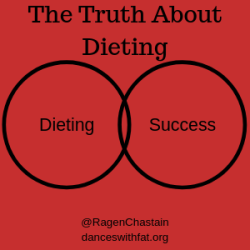 I have written a lot about strategies that fat people can use to attempt to overcome their healthcare provider’s weight bias in order to get competent evidence-based care. From cards that can help people have conversations, to lies that may have to be told in order to get necessary care. As always, I want to point out that fatphobia (medical and otherwise) becomes our problem, but it is not our fault and it shouldn’t be happening. We shouldn’t have to gear up for a doctor’s appointment.
I have written a lot about strategies that fat people can use to attempt to overcome their healthcare provider’s weight bias in order to get competent evidence-based care. From cards that can help people have conversations, to lies that may have to be told in order to get necessary care. As always, I want to point out that fatphobia (medical and otherwise) becomes our problem, but it is not our fault and it shouldn’t be happening. We shouldn’t have to gear up for a doctor’s appointment.
I have found that one of the most helpful things to ask a Healthcare Provider when they attempt to prescribe weight loss for a health condition is:
How do you treat this issue in thin people?
I hear from blog readers all the time who were able to use this question to get healthcare beyond the suggestion that they should try to look different (of course it isn’t foolproof, sometimes the HCP is simply unable to get beyond their weight stigma.)
This is good, but there’s actually quite a bit more to it. Getting the care that thin people get isn’t good enough, because that care is created FOR thin people. We deserve more than that. There are so many areas of healthcare that need to be fixed.
Let’s start with medical research. Research is typically done on “average weight” people, without even an attempt to understand how medications or procedures could best be created/used for fat people (despite the fact that we keep hearing about how many fat people are in society.)
Should dosage be increased by weight? Is this pill ineffective after a certain weight (like Plan B which starts to lose effectiveness at 165 pounds and becomes completely ineffective at 176 pounds.) The fact that they don’t even bother to consider fat people in most health research is a serious type of institutionalized oppression. (And, of course, fat people aren’t the only ones – people of color, trans and non-binary people, and women are a few of the groups who aren’t adequately represented in research, those with intersecting marginalizations even more so.)
This one’s a bit graphic, but those responsible for handling cadavers for medical schools won’t bother work with larger bodies, which means that future doctors don’t practice on fat bodies. (Considering that they had no problem flying a fat body 5,000 miles for an exploitative television show it seems like they already know how to solve this.)
Then, of course, there’s the fact that surgeons often tell fat people that they can’t do routine procedures on us because they are “too risky,” then recommend…wait for it…weight loss surgery. Not only is bariatric surgery often more dangerous than the surgery that the fat person actually needs, and not only are those who have had the stomach amputation surgery at additional risk for the surgery that they could have just had in the first place, but the idea that surgery is no problem if you want to mutilate your digestive tract in the hopes of creating a disease state that will force you to starve, but an arthroscopic surgery to fix your knee is just way too risky, would be laughable if it wasn’t being used to harm so many people.
At the absolute least, fat people deserve care that is based on research that includes fat patients, with equipment that was made to work for fat patients, from doctors who were educated on how to work on fat bodies, and are not operating out of weight stigma. It’s really not that much to ask.
Was this helpful? If you appreciate the work that I do, you can support my ability to do more of it with a one-time tip or by becoming a member. (Members get special deals on fat-positive stuff, a monthly e-mail keeping them up to date on the work their membership supports, and the ability to ask me questions that I answer in a members-only monthly Q&A Video!)
Like this blog? Here’s more stuff you might like:
Price: $25.00 ($10 for DancesWithFat members – register on the member page)
Click here for all the details and to register!
This e-course that includes coaching videos, a study guide, and an ebook with the tools you need to create a rock-solid relationship with your body. Our relationships with our bodies don’t happen in a vacuum, so just learning to see our beauty isn’t going to cut it. The world throws obstacles in our way – obstacles that aren’t our fault, but become our problem. Over the course of this program, Ragen Chastain, Jeanette DePatie, and six incredible guest coaches will teach you practical, realistic, proven strategies to go above, around, and through the obstacles that the world puts in front of you when it comes to living an amazing life in the body you have now.
Price: $99.00 Click here to register
($79.00 for DancesWithFat members – register on the member page)
Love It! 234 Inspirations And Activities to Help You Love Your Body
This is filled with thoughtful advice from the authors Jeanette DePatie, Ragen Chastain, and Pia Sciavo-Campo as well as dozens of other notable names from the body love movement, the book is lovingly illustrated with diverse drawings from size-positive artist Toni Tails.
Price: $9.99 softcover, $7.99 Kindle, ($6.95 + free shipping for DancesWithFat Members)
Book Me! I’d love to speak to your organization. You can get more information here or just e-mail me at ragen at danceswithfat dot org!
I’m (still!) training for an Iron-distance triathlon! You can follow my journey at www.IronFat.com .
via Dances With Fat https://ift.tt/2UPyFTv

 There is so much terrible information being spread about healthcare right now (some coming directly from the “president”) but this mess, found by Beckie H, might take the proverbial cake (Trigger Warning – discussion of food and dieting/disordered eating behaviors)
There is so much terrible information being spread about healthcare right now (some coming directly from the “president”) but this mess, found by Beckie H, might take the proverbial cake (Trigger Warning – discussion of food and dieting/disordered eating behaviors)
 I was recently part of a discussion about weight loss online. I was pointing out the research about intentional weight loss methods – and the fact that what the research shows is that most people can lose weight short term, but almost everyone gains it back long-term with most gaining back more than they lost. Someone immediately jumped in and said “I lost weight and kept it off, so what about that. Anyone can do it if they try hard enough.”
I was recently part of a discussion about weight loss online. I was pointing out the research about intentional weight loss methods – and the fact that what the research shows is that most people can lose weight short term, but almost everyone gains it back long-term with most gaining back more than they lost. Someone immediately jumped in and said “I lost weight and kept it off, so what about that. Anyone can do it if they try hard enough.” Greetings from social isolation, I hope that everyone reading this is doing as well as possible as we navigate this together. We’re in the middle of a global pandemic, so of course, people are using this opportunity to perpetuate fatphobic bullshit.
Greetings from social isolation, I hope that everyone reading this is doing as well as possible as we navigate this together. We’re in the middle of a global pandemic, so of course, people are using this opportunity to perpetuate fatphobic bullshit. I talk a lot about medical fatphobia (because medical fatphobia literally kills fat people,) and I’ve now heard from several super fat people who went for their annual visit to the gynecologist only to be told that the gynecologist doesn’t have the proper size speculum. In most cases, the person was just told outright that they couldn’t be helped (prompting them to e-mail me to see if I knew of any options.) But in one case the patient was told that specula that would work existed, and that if the patient wanted to buy one (the doctor suggested Amazon.com) they could bring it in for an exam. Then the doctor refused to refund their co-pay, since they “shouldn’t have expected” that they could be accommodated. With a speculum. At the gynecologist. For a pre-scheduled pap smear.
I talk a lot about medical fatphobia (because medical fatphobia literally kills fat people,) and I’ve now heard from several super fat people who went for their annual visit to the gynecologist only to be told that the gynecologist doesn’t have the proper size speculum. In most cases, the person was just told outright that they couldn’t be helped (prompting them to e-mail me to see if I knew of any options.) But in one case the patient was told that specula that would work existed, and that if the patient wanted to buy one (the doctor suggested Amazon.com) they could bring it in for an exam. Then the doctor refused to refund their co-pay, since they “shouldn’t have expected” that they could be accommodated. With a speculum. At the gynecologist. For a pre-scheduled pap smear.
 I started this post a while ago, but it seems extra pertinent now that more kids are hanging out at home reading!
I started this post a while ago, but it seems extra pertinent now that more kids are hanging out at home reading! I want to start by saying that I’m not trying to give anyone advice on how to handle the current pandemic. I am personally taking as many precautions as possible. I also want to acknowledge that our choices as to how to handle this are all affected by our privilege and that the most marginalized people face the most harm.
I want to start by saying that I’m not trying to give anyone advice on how to handle the current pandemic. I am personally taking as many precautions as possible. I also want to acknowledge that our choices as to how to handle this are all affected by our privilege and that the most marginalized people face the most harm. Fatphobia, weight stigma, and weight-based oppression are not in our heads – they are real and fat people experience them constantly in everything from
Fatphobia, weight stigma, and weight-based oppression are not in our heads – they are real and fat people experience them constantly in everything from